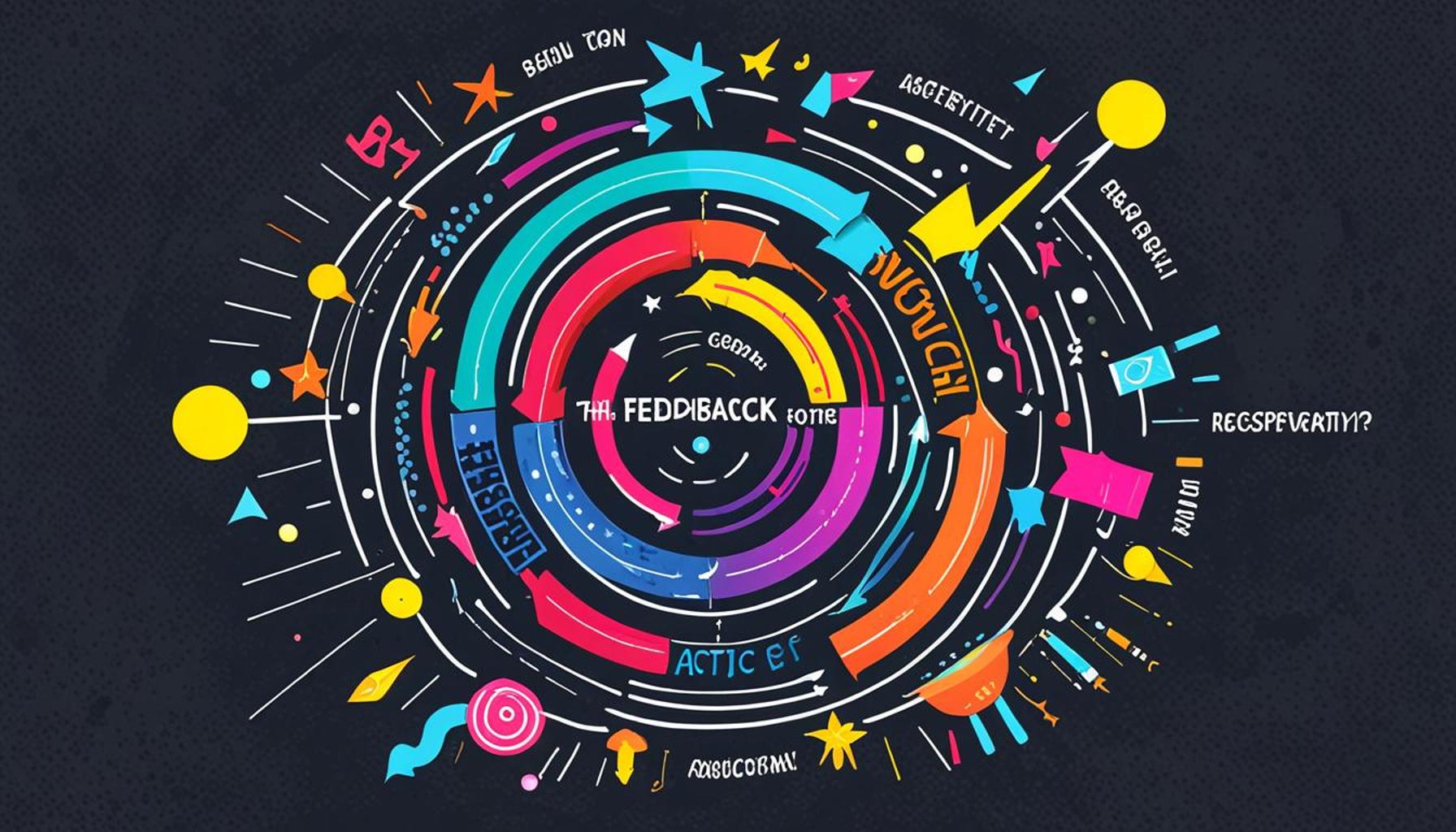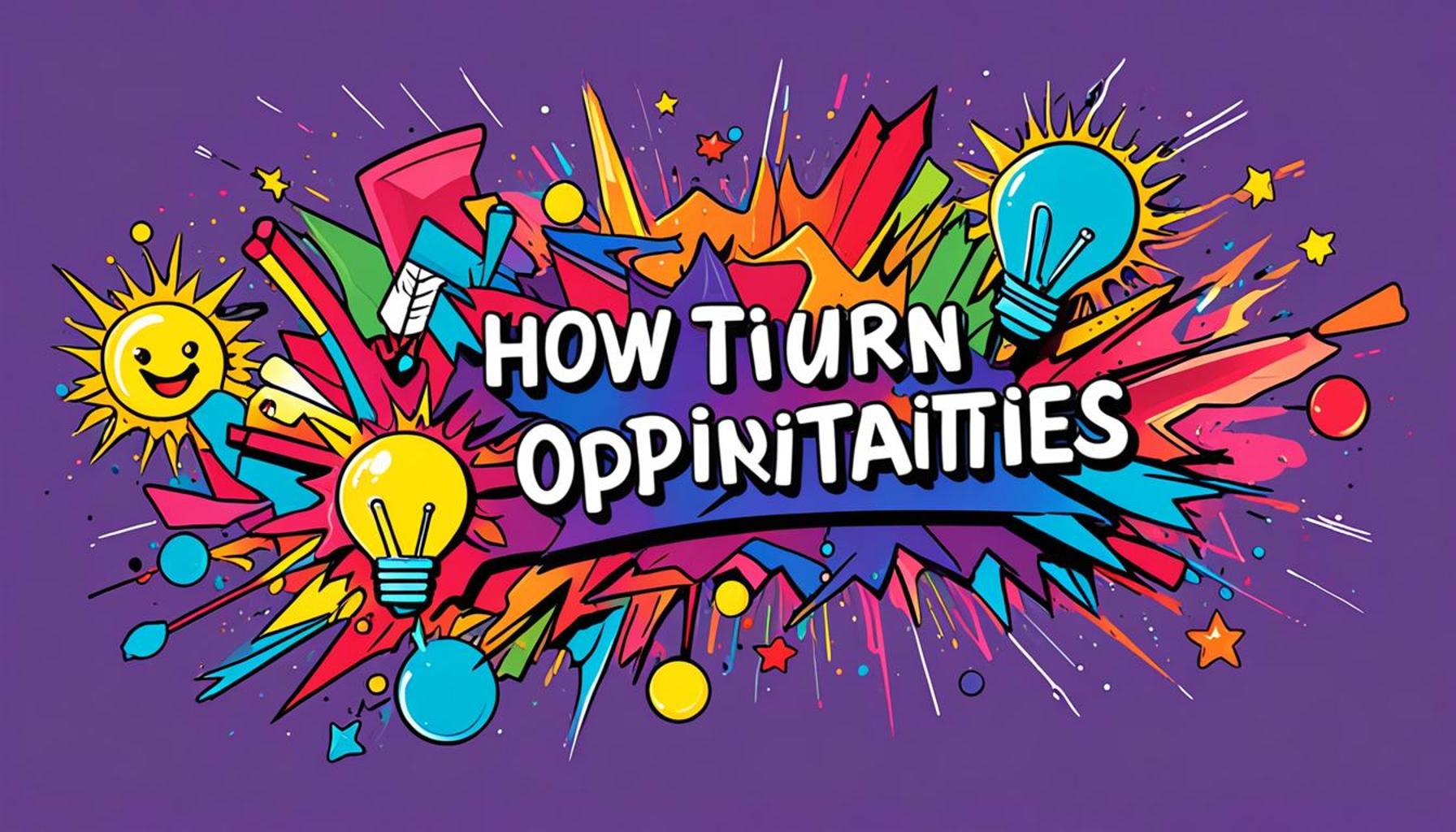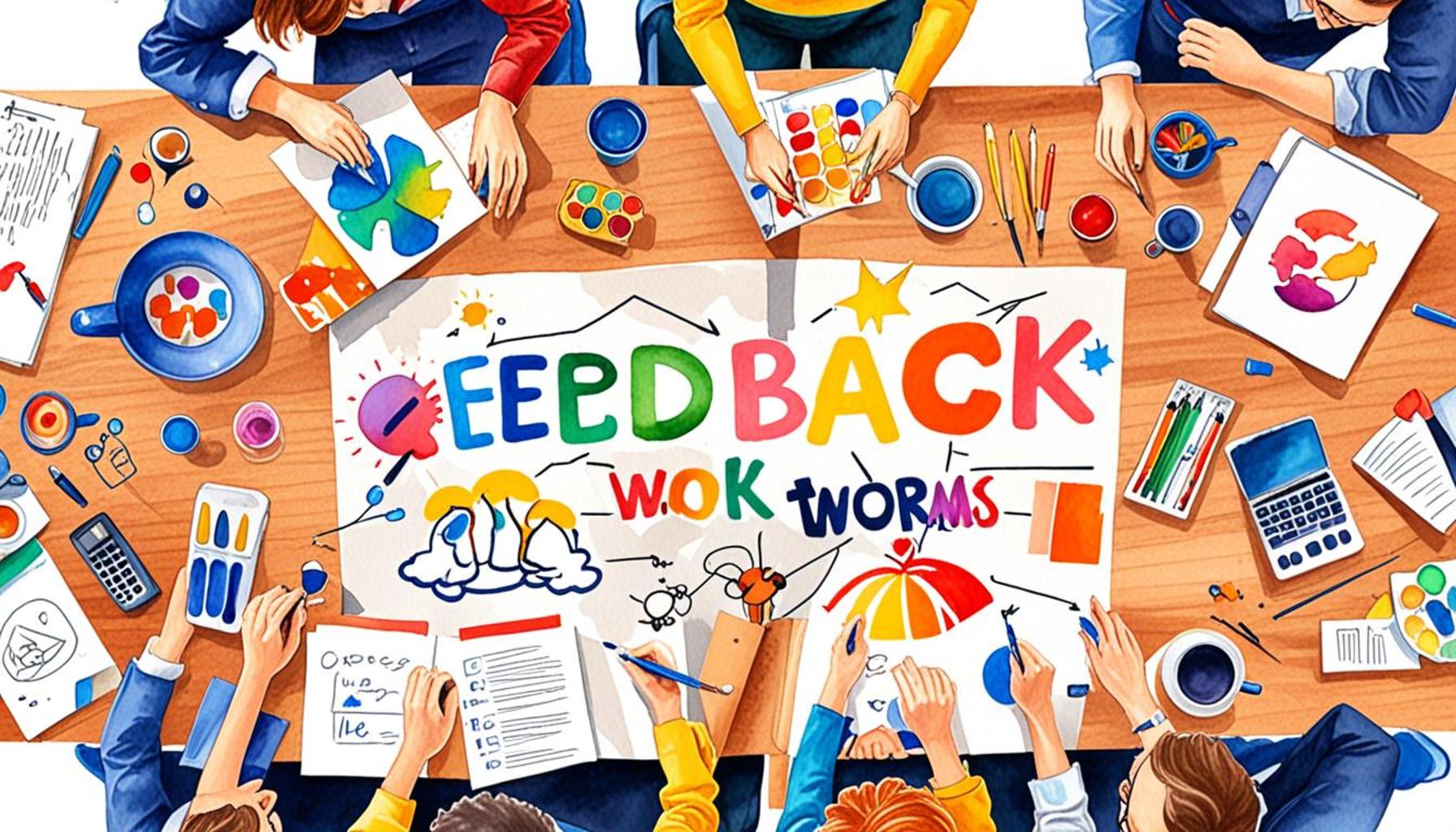The Feedback Cycle: How Receptiveness and Action Foster a Growth Mindset

Unlocking Potential Through Feedback
The journey towards personal and professional growth often hinges on the ability to embrace feedback. In the dynamic environment of Nigeria’s evolving job market, receptiveness to criticism can pave the way for innovation and success. Understanding the feedback cycle not only enhances individual capabilities but also strengthens team collaboration, which is paramount in a country rich with talent yet beset by challenges.
Key Elements of a Growth Mindset
To foster a growth mindset, several essential elements come into play:
- Receptiveness: Being open to feedback is crucial. In Nigerian companies, where hierarchical structures can sometimes hinder communication, cultivating environments that encourage feedback can transform organizational culture.
- Action: Implementing changes based on feedback leads to improvement. For instance, many businesses in Nigeria are increasingly relying on customer reviews to tweak their offerings, which can lead to greater customer satisfaction and loyalty.
- Reflection: Taking time to contemplate what feedback means helps in understanding personal growth. This might manifest in a young graduate contemplating critiques from internship supervisors, leading to informed career choices.
In Nigerian contexts, where educational and corporate reforms are ongoing, the interaction between receptiveness and action can serve as a transformative tool. Consider how a local entrepreneur might pivot their business model based on customer suggestions—perhaps a fashion designer decides to focus more on sustainable materials after clients express concern for the environment. Similarly, a teacher might adjust their methods in response to student input, employing diverse teaching styles to cater to different learning preferences. By embracing such feedback, individuals can not only navigate challenges but thrive amidst them.
Bridging Challenges and Opportunities
This understanding is crucial, especially as Nigeria faces unique challenges such as rapid urbanization and rising unemployment. For instance, with the economic shifts leading to a growing gig economy, adaptability becomes vital. Developing a robust feedback cycle allows individuals to harness their potential, thereby transforming community challenges into opportunities for growth.
Furthermore, the impact of technology cannot be overstated. Various digital platforms are now available for collecting feedback, from social media to tailored survey tools, allowing organizations and individuals to engage more meaningfully. By leveraging these tools, businesses can stay ahead of trends, and professionals can cultivate their skills continuously, fostering resilience and adaptability critical for success.

As the country continues to evolve, understanding the power of feedback and its role in personal and professional development becomes ever more important. It not only promotes a culture of continuous learning but also encourages collaboration and innovation in addressing Nigeria’s pressing issues.
CHECK OUT: Click here to explore more
Embracing Feedback as a Catalyst for Growth
The essence of a successful feedback cycle lies in the delicate balance of receptiveness and action. In Nigeria, where diverse social dynamics and varying educational backgrounds often influence interaction, honing one’s ability to receive and act on feedback can unveil a pathway to substantial personal and organizational growth. Embracing feedback doesn’t merely alter an individual’s approach; it transforms entire cultures within workplaces and educational institutions.
The Role of Receptiveness in the Feedback Cycle
Being receptive to feedback is about more than tolerating criticism; it involves actively seeking constructive input and viewing it as an opportunity for enhancement. In many Nigerian workplaces, traditional views may discourage junior employees from voicing their opinions or challenging established norms. This can stymie innovation and hinder progress. However, companies that champion open communication create an environment where feedback flows freely, boosting morale and fostering creativity.
For example, a technology startup in Lagos that encourages its software developers to share ideas and concerns regularly can adapt more quickly to changes in the fast-paced tech landscape. By nurturing a culture of receptiveness, these companies realize the true potential of their workforce and can pivot rapidly to meet market demands.
Taking Action: The Bridge from Feedback to Improvement
Once feedback is received, the next step involves taking concrete actions based on that information. In Nigeria’s entrepreneurial landscape, where ambition meets unpredictability, this action-oriented mindset can determine success or failure. Businesses that leverage customer feedback to refine their products or services not only gain a competitive edge but also build a loyal customer base. A food vendor who adjusts their menu items according to customer preferences, for instance, may find themselves thriving in a crowded market, winning regular patrons by showcasing their responsiveness to customer desires.
Additionally, the educational sector illustrates the importance of action in the feedback cycle. Educators who implement student feedback into their teaching strategies often see improved academic outcomes. A school in Abuja might change its curriculum based on student input, resulting in enhanced engagement and performance. This direct feedback loop helps students feel valued and heard, promoting a sense of ownership over their learning journey.
Benefits of a Feedback Cycle for Personal Development
The profound effects of an effective feedback cycle extend into individual personal growth. Embracing feedback empowers individuals to:
- Identify Strengths and Weaknesses: Regular feedback helps individuals recognize their unique capabilities while uncovering areas for development.
- Enhance Skills: By responding to constructive criticism, individuals can refine their skills and adapt to evolving professional demands.
- Build Resilience: Learning to accept and act on feedback fosters a resilient mindset, essential for navigating Nigeria’s challenging job market.
As the landscape of work in Nigeria continues to shift and evolve, becoming adept at navigating the feedback cycle will not only bolster personal growth but will also empower organizations to thrive. By fostering a culture that values receptiveness and action, we can unlock a broader potential within both individuals and communities.
| Advantage | Description |
|---|---|
| Enhanced Learning | A feedback cycle nurtures a continuous learning culture, helping individuals adapt and improve over time. |
| Increased Collaboration | When teams engage in open feedback, they foster stronger relationships and can tackle challenges more effectively. |
Emphasizing receptiveness allows individuals to appreciate constructive criticism, which is essential in the growth mindset approach. The idea is not only to accept feedback but to act upon it, creating a productive cycle where input leads to actual change and improvement. For example, organizations that prioritize this cyclical feedback among employees often see notable enhancements in performance metrics. Moreover, by creating an atmosphere where questions and suggestions are encouraged, receptiveness facilitates an environment of trust, making team members more likely to share insights. This collaborative spirit can lead to innovative solutions and a unified direction towards goals.Incorporating regular feedback sessions not only strengthens teamwork but also empowers individuals to take ownership of their development. It emerges as a powerful tool—one that not only drives personal success but also steers the organization towards achieving its objectives effectively. As we delve deeper into this topic, consider how you can begin to implement these practices within your own teams or personal endeavors.
RECOMMENDED: Check out this similar article
Cultivating a Feedback Culture in Nigeria
Building a robust feedback culture is pivotal for both personal and organizational growth. In Nigeria, where traditional attitudes may hinder open dialogue, fostering a culture of receptiveness is essential to facilitate the feedback cycle. Organizations and educational institutions must prioritize training programs and workshops designed to enhance communication skills, making it easier for individuals at all levels to engage in meaningful dialogue.
Implementing Structured Feedback Mechanisms
Developing structured feedback mechanisms can significantly enhance the feedback cycle. In many Nigerian organizations, feedback is often sporadic and informal, which can lead to mixed messages and unclear expectations. By introducing formal feedback processes, such as bi-annual performance reviews or monthly team check-ins, organizations ensure that feedback becomes part of the regular workflow. This structure not only helps create accountability but also encourages individuals to take feedback seriously and act upon it.
A notable example can be seen in a Nigerian bank that transitioned to a structured feedback system, where employees received evaluations from both peers and managers. This initiative, known as a 360-degree feedback process, allowed employees to gain a holistic view of their performance. The insights generated from this framework enabled them to focus on specific areas for improvement, leading to enhanced productivity and job satisfaction.
The Influence of Leadership in the Feedback Cycle
Leadership plays a crucial role in shaping a receptive environment for feedback. Leaders who model openness and vulnerability by actively seeking input and sharing their own learning experiences encourage their teams to do the same. When executives in Nigerian corporations demonstrate that they value and act on feedback, they set a powerful example, demonstrating that growth is a continuous journey rather than an endpoint.
For instance, a prominent Nigerian telecommunications company witnessed dramatic improvements in employee engagement after its CEO instituted an open-door policy. Employees felt more confident in approaching leadership with ideas and concerns, knowing their perspectives would be valued. This shift not only fostered trust but also fueled innovation within the organization, as employees felt empowered to contribute to the company’s direction.
Harnessing Technology for Effective Feedback
As technology penetrates various sectors in Nigeria, harnessing digital platforms for feedback is becoming increasingly viable. Online survey tools and mobile applications can facilitate real-time feedback collection, making the process more efficient. These tools allow organizations to gather data swiftly, analyze it, and respond promptly to employee or customer insights.
Moreover, adopting technology enhances anonymity, which can be vital in environments where individuals fear reprisal. For example, an e-learning platform in Nigeria used anonymous surveys to gather student feedback on their courses. By analyzing the data, educators identified gaps in curriculum delivery and made immediate changes, significantly improving student satisfaction and retention rates.
Encouraging Peer-to-Peer Feedback
In addition to top-down feedback mechanisms, encouraging peer-to-peer feedback is equally beneficial in fostering a growth mindset. In Nigerian cultural contexts where respect for hierarchy may dominate, it is essential to create pathways for open dialogue among colleagues. Through teamwork and collaborative projects, employees learn to give and receive feedback from their peers constructively.
Workshops centered around feedback strategies can help demystify the process, equipping employees with the skills needed to provide constructive, respectful, and actionable feedback. A marketing agency in Ibadan, for example, initiated peer evaluation sessions, resulting in improved collaboration and significantly enhanced project outcomes due to the collective input of team members.
LEARN MORE: This related article may interest you
Conclusion
In closing, the feedback cycle stands as a vital component in nurturing a growth mindset within individuals and organizations, particularly in Nigeria where traditional attitudes may act as barriers to open communication. By cultivating a culture of receptiveness, organizations can dismantle these barriers, enabling constructive dialogues that drive innovation and personal development. Structured feedback mechanisms, when effectively implemented, provide the framework necessary to ensure clarity and accountability, transforming feedback from a sporadic occurrence into an integral element of organizational processes.
Moreover, the role of leadership cannot be overstated—leaders who exemplify openness foster an environment where feedback is not only welcomed but sought after. Their actions encourage teams to embrace feedback as a tool for growth rather than a source of criticism. In the Nigerian context, where hierarchical structures may inhibit open dialogue, integrating technology and encouraging peer-to-peer feedback can democratize the feedback process, making it accessible to all levels of the organization.
Ultimately, the feedback cycle—rooted in receptiveness and proactive action—holds the potential to propel individuals and organizations towards excellence. As Nigeria continues to evolve in an increasingly competitive landscape, embracing this cycle will equip its workforce with the necessary skills to adapt, innovate, and thrive. Moving forward, it is imperative that organizations not only recognize but actively engage in this process, laying the groundwork for a more dynamic and resilient future.


